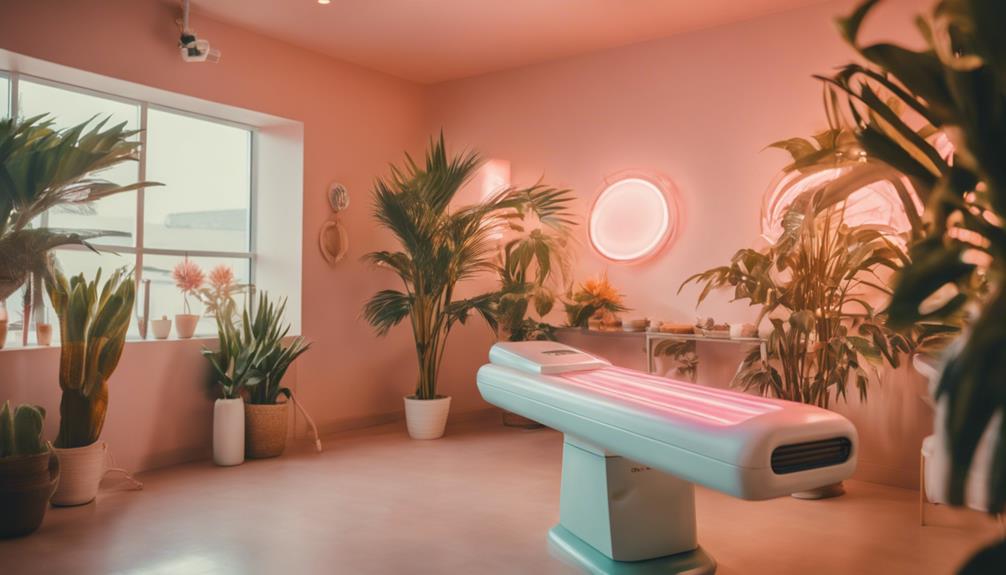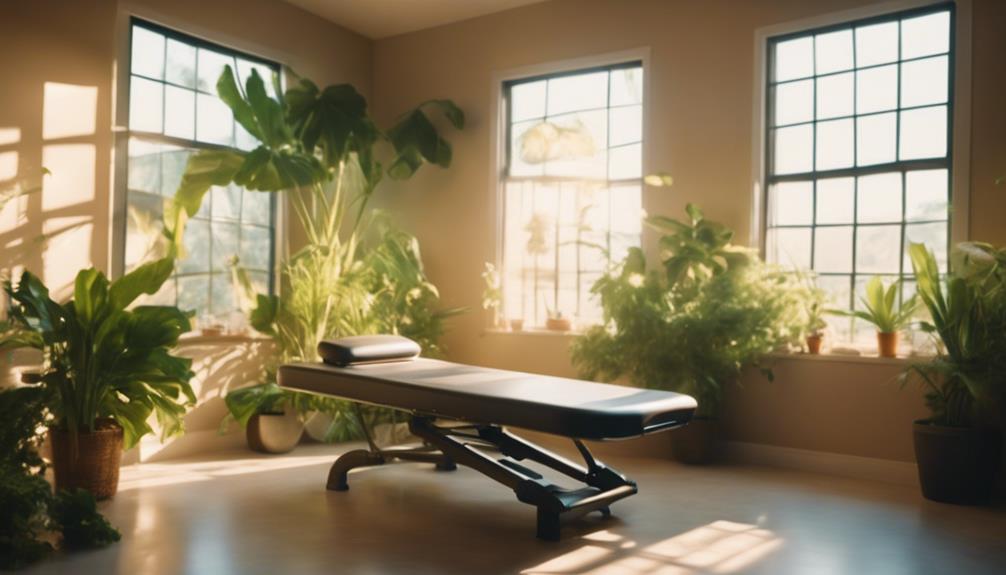Tanning beds can be a fun way to get that golden glow, but you gotta play it safe! Start with short sessions of 5-10 minutes, especially if you're a newbie, and don't forget to use a bronzer lotion loaded with moisturizing goodies like aloe. Always rock those protective goggles—your eyes will thank you later! After tanning, treat your skin right by applying a moisturizer and skipping hot showers. Keep your sessions regular, but not too frequent; consistency is the secret sauce for a fabulous tan. Stick around, and you'll discover even more insider tricks to keep your skin shining bright!
Key Takeaways
- Always wear protective eyewear to prevent serious eye injuries from UV rays during tanning sessions.
- Start with short tanning sessions (5-10 minutes) to avoid overexposure and skin damage.
- Use bronzer lotion specifically designed for indoor tanning, ensuring it contains moisturizing ingredients.
- Follow post-tanning protocols, such as applying moisturizer and avoiding hot showers, to maintain your tan.
Understand Tanning Time Limits
To protect your skin and maintain a healthy glow, it's important to stick to the recommended tanning time limits based on your skin type and the specific tanning bed you're using.
Think of it like cooking a perfect steak—you wouldn't want it too rare or overdone! Start with short sessions, like 5 to 10 minutes, especially if you're new to tanning. Gradually build up your tan over time, but don't get too carried away.
Once you've achieved your desired color, limit your sessions to once a week. Remember, overexposure to UV rays isn't just bad news for your skin; it could lead to long-term damage.
Choose the Right Bronzer Lotion

Finding the right bronzer lotion is just as important as sticking to safe tanning time limits, as it can enhance your color while keeping your skin healthy and hydrated.
You want a lotion specifically designed for indoor tanning, packed with moisturizing goodies like aloe and shea butter. These ingredients help your skin feel smooth and prevent it from drying out, which is a win-win!
Look for lotions with natural bronzers—those give you that lovely, sun-kissed glow without any orange surprises. Plus, some bronzers come loaded with vitamins and antioxidants, giving your skin a little extra love.
Wear Protective Eyewear

Why risk your eye health when wearing protective eyewear during tanning sessions is a simple yet vital step? You wouldn't go swimming without goggles, right? The same logic applies here! Protecting your eyes is important, and here's why:
- Prevent Eye Injuries: UV rays can cause serious damage, leading to painful conditions.
- Compliance: Most tanning salons legally require protective eyewear, so don't skip it!
When you pop those UV-blocking goggles on, you're not just following the rules, you're prioritizing your health.
Follow Post-Tanning Protocols

After tanning, it's crucial to follow specific protocols to maintain your glow and protect your skin.
First off, apply a tan extender or moisturizer right away. This helps lock in that sun-kissed color and keeps your skin hydrated, making it feel soft and smooth.
Next, avoid hot showers or baths for a bit, as they can strip away your tan faster than a kid running from a bee! Also, steer clear of harsh exfoliants for a few days. Remember, your skin's delicate right now.
Finally, don't forget to sip plenty of water to keep your skin glowing from the inside out.
Following these steps will help you rock that tan while keeping your skin happy and healthy!
Maintain Regular Tanning Sessions

To keep your tan looking vibrant and minimize skin damage, schedule regular tanning sessions that align with your skin type and desired glow. Think of it like watering a plant; consistency is key!
Here are some tips to make the most of your tanning routine:
- Start slow: Begin with shorter sessions to build your tan gradually.
- Frequency matters: Aim for once a week after achieving your desired color, just like a weekly pizza night!
Frequently Asked Questions
How Often Should I Clean My Tanning Bed?
You should clean your tanning bed after every use to maintain hygiene. Regularly disinfect the surface, including the acrylic and surrounding areas, ensuring a safe experience for yourself and others who may use it later.
Can I Tan if I Have a Sunburn?
Sure, you can absolutely tan with a sunburn—if you enjoy worsening your skin's condition! Instead, let your sunburn heal first; your skin will thank you and you'll achieve a better tan later.
What Should I Do if I Feel Dizzy While Tanning?
If you feel dizzy while tanning, stop immediately and leave the tanning bed. Sit down, hydrate, and take deep breaths. If dizziness persists, seek medical attention to guarantee your safety and well-being.
Are There Age Restrictions for Using Tanning Beds?
Yes, there're age restrictions for using tanning beds. Most states require users to be at least 18 years old. Some places may allow minors with parental consent, but it's best to check local regulations first.
What Are the Signs of Tanning Bed Overexposure?
You might notice unusual redness, excessive peeling, or a burning sensation—these are signs you've overexposed yourself to the tanning bed. Pay attention; ignoring these symptoms can lead to serious skin damage and discomfort.
How Does Hygiene Impact Safety for Tanning Bed Users?
Tanning safety hygiene tips are crucial for tanning bed users. Proper hygiene can help prevent the spread of bacteria and viruses, reducing the risk of skin infections. Clean the tanning bed before and after use, wear protective eyewear, and avoid sharing towels or lotions to maintain a safe tanning experience.
Conclusion
By following these essential safety tips, you can enjoy your tanning bed experience while keeping your skin healthy.
Did you know that about 30% of people who use tanning beds develop skin cancer? Yikes! That's a big reason to be cautious.
Remember to keep an eye on your tanning time, wear those stylish goggles, and choose a bronzer that'll make your skin glow.
Happy tanning, and stay safe out there!









